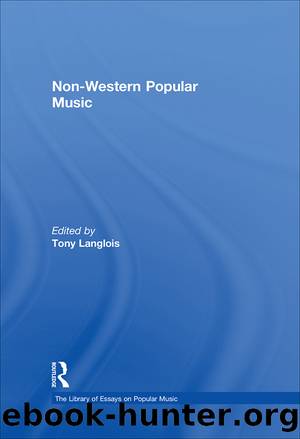Non-Western Popular Music by Tony Langlois

Author:Tony Langlois [Langlois, Tony]
Language: eng
Format: epub
ISBN: 9781351556149
Barnesnoble:
Publisher: Taylor & Francis
Published: 2017-07-05T00:00:00+00:00
Conclusions
Cuban rap has gone from a street subculture to an official, sponsored part of national culture in the space of a decade. An examination of this development reveals the extent to which the formation of national culture is negotiated on a variety of levels rather than being imposed from above, constituting not a top-down process but a consensus forged through discussions among practitioners, key cultural intermediaries, and state officials (Askew 2002; Wade 2000). For all that the aim to ânationalize rapâ was articulated by the Minister of Culture, this process has not simply been one of âstate appropriationâ or any other such abstraction which denies the active participation of non-elite sectors; rather, it reflects how rap could be talked about fruitfully by different sectors of Cuban society. Non-Cubans have also played a significant part in the assimilation of rap in Cuba, both on a practical level but also by contributing to the production of rap discourses.There is a palpable sense of self-belief about the Cuban rap movement which comes as much from the approval of foreign observers as it does from acceptance by the state or popularity among audiences, and which has nothing to do with commercial success. Much of the writing about global hip hop has focused on the local uses of globalized cultural tools, but what is notable in the Cuban context is the involvement of foreigners at every stage of the process. Ian Condry writes of the arrival of hip hop in Japan as âa flying spark that traveled from the Bronx across the ocean to light a fire.This image of a flying spark is important, for it reminds us that although popular music styles travel on the winds of global capitalism, they ultimately burn or die out on local fuelâ (Condry 2001:222).Though there is clearly plenty of fuel in Cuba, it was not just the spark of rap that flew across the ocean but a host of U.S. rappers, journalists, activists, academics, and documentary-makers in its wake to fan the flames, revealing that Cuban hip hop continued to be transnational in a very concrete sense long after it had taken root. Non-Cubans, too, found that they could talk productively about Cuban rap, and they profoundly influenced its ânationalization.â
It is important to uncover the complex, negotiated nature of the assimilation of rap in order to form a considered response to state involvement. When I went to a screening of the Cuban hip hop documentary Inventos in London, I was struck that the audience laughed when Pablo Herrera mentioned Abel Prietoâs statement in 1999 that it was time to nationalize rap.22 This brought home to me that most non-Cubans and Cuban emigres tend to assume that nationalization and rap are incompatible, or that nationalization is a negative concept with respect to popular music. However, I suspect that many Cuban audiences, or indeed rappers, would not have found this remark particularly strange; after all, it was the leading rap groups who clamored for their own agency, and many AHS
Download
This site does not store any files on its server. We only index and link to content provided by other sites. Please contact the content providers to delete copyright contents if any and email us, we'll remove relevant links or contents immediately.
The Goal (Off-Campus #4) by Elle Kennedy(13650)
Kathy Andrews Collection by Kathy Andrews(11807)
Diary of a Player by Brad Paisley(7552)
What Does This Button Do? by Bruce Dickinson(6194)
Assassin’s Fate by Robin Hobb(6194)
Big Little Lies by Liane Moriarty(5782)
Altered Sensations by David Pantalony(5091)
Pale Blue Dot by Carl Sagan(4994)
Sticky Fingers by Joe Hagan(4186)
The Death of the Heart by Elizabeth Bowen(3601)
The Heroin Diaries by Nikki Sixx(3538)
Beneath These Shadows by Meghan March(3298)
Confessions of a Video Vixen by Karrine Steffans(3295)
How Music Works by David Byrne(3256)
The Help by Kathryn Stockett(3139)
Jam by Jam (epub)(3071)
Harry Potter 4 - Harry Potter and The Goblet of Fire by J.K.Rowling(3055)
Computational Linguistics and Intelligent Text Processing: 20th International Conference, CICLing 2019 La Rochelle, France, April 7â13, 2019 Revised Selected Papers, Part I by Alexander Gelbukh(2978)
Strange Fascination: David Bowie: The Definitive Story by David Buckley(2855)
